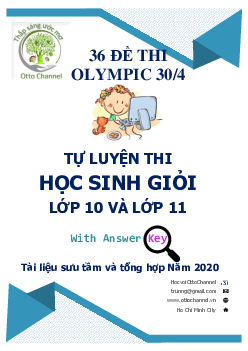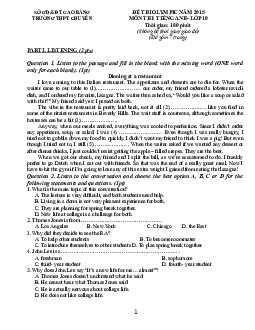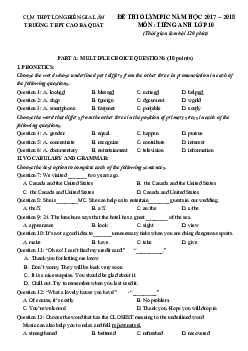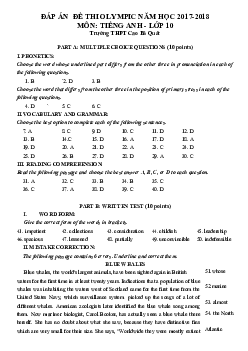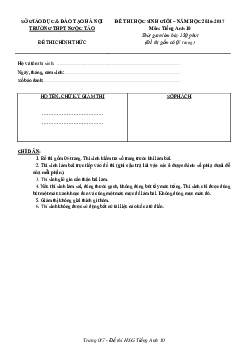









Preview text:
TRƯỜNG THPT CHUYÊN NGUYỄN TRÃI ENGLISH TEST FOR GIFTED STUDENTS
TỈNH HẢI DƯƠNG Time allowed : 180minutes
Name: ................................................... Class: 10 English
____________________________________________________________________________ I. LISTENING ( 30 pts)
Part 1. Listen and choose the correct answer to each question.
1. These sessions with a counselor are _____.
A. compulsory for all students B. available to any students C. for science students only
2. The counselor says that new students have to _____.
A. spend more time on the college premises B. get used to working independently
C. work harder than they did at school
3. John complains that the resource center _____.
A. has limited opening hours B. has too few resources C. gets too crowded
4. The counselor suggests to John that _____.
A. most other students can cope B. he needs to study all the time
C. he should be able to fit in some leisure activities
5. Before being able to help John, the counselor needs to _____.
A. talk with some of his lectures B. consult his tutor
C. get more information from him Part 2.
Q1-5: Listen and decide whether the following statements are true (T) or false (F).
1. The Australian Quarantine Service is responsible for preventing diseases from being introduced into the country.
2. In the past Asian honey bees have been found in Queensland, Australia.
3. A problem with Asian honey bees is that they attack native bees.
4. Australian bees’ size stops them from pollinating some flowers.
5. If Asian honey bees got into Australia, the country’s economy would be affected.
Q6-10: Listen and complete the summary below. Write ONE WORD ONLY for each answer. Write
your answer in the space provided.
Looking for Asian honey bees
Birds called Rainbow Bee Eaters eat only insects, and cough up small bits of skeleton and other products in a pellet.
Researchers go to the locations the bee eaters like to use for (6) ____________. They collect the
pellets and take them to a (7) __________________ for analysis.
Here (8) ________________ is used to soften them, and the researchers look for the (9)
______________ of Asian bees in the pellets.
The benefit of this research is that the result is more (10) _________________ than searching for live Asian bees.
TRƯỜNG THPT CHUYÊN NGUYỄN TRÃI ENGLISH TEST FOR GIFTED STUDENTS
TỈNH HẢI DƯƠNG Time allowed : 180minutes
Name: ................................................... Class: 10 English
____________________________________________________________________________
PART II – GRAMMAR AND VOCABULARY
I. Choose the best answer. (20 points)
1. The size of t he pop-star’s personal fortune was the subject of much ____ in the press. A. doubt B. guessing C. speculation D. wonderment
2. Make sure you ____ the cards before we start the next game. A. turn B. mix C. alternate D. shuffle
3. The junior staff was ___ from all aspects of decision making. A. excluded B. limited C. confined D. restricted
4. Jeremy’ friends were fond of him ____because of his generosity. A at least B. still less C. even less D. not least
5. The thick fog ____ out any possibility of our plane taking off before morning. A. ruled B. struck C. stamped D. crossed
6. Lack of rain early in the season meant that the fields ____ a poor crop. A. yielded B. generated C. surrendered D. suffered
7. Looking down at the coral reef, we saw ____ of tiny, multi-colored fish. A. swarms B. flocks C. teams D. shoals
8. The doctor was praised for her ____ work with her patients. A. groundless B. tireless C. bottomless D. restless
9. Jack was ___ to the fact that he couldn’t take his holiday in June. A. accepted B. complied C. agreed D. resigned
10. The amount Sarah earned was ___ on how much she sold. A. related B. connected C. dependent D. secured
11. When old Mr. Barnaby died, several people ____ their claim to the substantial legacy that he left. A. placed B. drew C. assumed D. laid
12. On entering the nursery I stumbled on the wooden blocks ____ all over the carpet A. plunged B. scattered C. settled D. tossed
13. Ever since we quarreled in the office, Janice and I have been ____ enemies A. assured B. confirmed C. defined D. guaranteed
14. The schoolboy’s excuse wasn’t ____ at all. Nobody in the classroom believed in the far-fetched story he told. A. credential B. credible C. creditable D. credulous.
15. The bad weather and a lack of food simply ____ our problem A. compounded B. enhanced C. salvaged D. transformed
16. I don’t agree with ____ very young and pretty criminals A. committing B. enforcing C. imprisoning D. offending
17. The popular press often contains a lot more ____ than hard facts. A. speculation B. realism C. influence D. tolerance
18. The train whistle warned us of its ____ departure A. previous B. imminent C. subsequent D. former
19. Time and neglect had ____ the property A. deteriorated B. enhanced C. flourished D. acclimatized
20. Get going! All the students were ____ around, waiting until the last minute to go into the building A. dwelling B. lingering C. staggering D. running
II. There are 10 mistakes in the paragraph, find and correct. (10 points)
The beginning of the decline of the painting portrait coincided roughly speaking to the rise of
photography. The photographer had taken place of the portrait painter. Photography was more
accurate, quicker and far more cheaper, it offered the opportunity of the portraiture for the whole of
society whereas previously such as opportunity had been the privilege of a very small elite.
To counter the logical of the argument, painters and their patrons invented a great deal of mysterious,
metaphysical qualities with which to prove that which the painted portrait offered was incomparable.
Only men, not a machine could interpret the soul of a sitter. An artist dealed with the sitter’s destiny;
the camera with merely light and shape.
1. ............................ 2. ............................. 3. ................................. 4. .............................. 5. .....................
6. ........................... 7. .............................. 8. ............................... 9. .............................. 10....................
III. Fill in each blank with one suitable article or preposition. (10 points)
1. The suspect was released from prison…………………..bail.
2. You should always have a card…………………..your sleeve.
3. He went…………………..his own accord: nobody forced him to go.
4. He shot the bird while it was ………………….the wing.
5. The survivors of the Titanic were……………..sea for several days before being rescued.
6. My husband brought me some flowers today. He must be…………………..something!
7. Does it matter what a national politician does …….. private as long as he performs well in his job?
8. Stop wasting time! Get to my office…………………..the double.
9. I’m afraid I can’t come to the concert with you. I’m…………..my ears in work this week.
10. Breaking his leg a second time put Peter’s football career…………………..jeopardy.
IV. Give the correct form of the word. (10 points)
The (1. assert)…………………. that mathematics has been a major force in the of modern culture
appears to many people (2. credible) …………………………..or, at best, a rank exaggeration. This
(3. believe) ………………………………results from a very common but (4. error)
……………………………..conception of what mathematics really is. Influenced by what was taught
in school, the average person regards mathematics as a series of techniques of use only to the
scientists, the engineer and perhaps the (5. finance)…………………………………. The reaction to
such teaching is (6. taste) ……………………………. for the subject and a decision to ignore it. When
challenged on this decision, a well-read person can obtain the support of authorities. No less than a (7.
person) …………………………than Schopenhauer, the philosopher, described mathematics as the (8.
low) …………………………..activity of the spirit, as is shown by the fact that it can be performed by
a machine. Despite such (9. authority) ………………………….judgments, the layman’s decision to
ignore mathematics is wrong. The subject is not a series of techniques. These are indeed the least
important aspects. The techniques are mathematics stripped of motivation, (10 reason)
……………………, beauty and significance. PART III – READING
I. Read the passage and choose the best option to fill in each blank. (10 points)
The point at which physical decline with age begins adversely to affect a driver’s capacity has
not yet been thoroughly studied. A survey of more than 3,000 road accidents in Michigan 1___ drivers
aged over 55 showed that in eight out of ten cases it was a driver over the age of 71 who had 2___ a
collision by failing to yield, turning carelessly or changing lanes. Older drivers are obviously more
3___ to injury in vehicle crashes, as well as being potential higher risk through their own driving
4_____. Reaction time in an emergency involves many different physical 5____ such as the production
of the nerve impulse, perception of the signal, 6____ of response and transmission to the muscles.
Some of these deteriorate more than others with age, but the overall effect increases the time it takes to
respond for more 7____ drivers. Part of the aging process, however, does include the 8 ___of
experience, often in the subconscious, which triggers earlier danger warnings than in younger drivers
who have not experienced similar situations. This 9 ___ of judgment heightens the perception of risk
and often 10 ____ older drivers to avoid a situation. 1. A. reflecting B. involving C. excluding D. asking 2. A. avoided B. prevented C. caused D. activated 3. A. likely B. susceptible C. possible D. common 4. A. practice B. activity C. experience D. behavior 5. A. events B. parts C. factors D. forms 6. A. choice B. suggestion C. section D. preference 7. A. mature B. ancient C. older D. elderly 8. A. collection B. addition C. storage D. summary 9. A. lack B. maturity C. absence D. strength 10. A. follows B. progresses C. leads D. pulls
II. Read the passage and choose the best answer to each of the questions. (10 points) Theories of life on Mars
In the mid-1700s, astronomers observed polar ice caps on Mars. William Herschel saw that the ice
caps changed in size with the seasons. The presence of water and seasons, features present on Earth,
prompted speculation that life might exist on Mars.
Improved telescopes in the nineteenth century further fueled these speculations. They allowed
Mars’s surface features to be identified. In 1877, an Italian astronomer, Giovanni Schiapareli, used a
22-centimeter telescope to draw the first map of Mars. His map depicted long lines that he called
canali, the Italian word for channels. But his term was mistakenly translated into English as canals.
Because channels are usually natural and canals are manmade, the mistake gave birth to imaginative
theories of life on Mars over the next 100 years.
The leading proponent of the view that the canals were built by intelligent beings was an American
astronomer, Percival Lowell. At the Lowell Observatory in the high altitude and clear air of Flagstaff,
Arizona, Lowell studied Mars extensively and made detailed drawings of its surface features. He
published books about his Mars studies, including Mars and Its Canals in 1906 and Mars As the Abode
of Life in 1908. Lowell proposed that the canals had been constructed by a long-extinct civilization as
an elaborate irrigation system. The canals conveyed water from the polar regions to the dry population
centers of the planet. Lowell’s ideas were embraced by popular culture. The British novelist H.G.
Wells wrote the most famous novel describing life on Mars, War of the Worlds. He imagined that
Martians invaded Earth in order to flee the death of their own planet.
Bigger and better telescope lenses in the twentieth century failed to confirm that the features
Lowell observed really were canals. In fact, they ultimately were shown to be optical illusions.
Life on Mars was dealt a further blow beginning in 1965. The United States launched the Mariner
spacecrafts to fly close to the surface to take photographs and test the atmosphere. Those probes
showed that Mars has a thin atmosphere made mostly of carbon dioxide and that the polar ice caps are
frozen dioxide, not water. The photos revealed that Mars had no rivers, oceans, or any other visible
signs of life. Scientists concluded that Mars’ thin atmosphere and lack of a magnetic field made it
vulnerable to harmful cosmic radiation. Biological and soil experiments were conducted by the Viking
project in 1976. To the scientists’ surprise, the test showed that Mars’s surface has no organic matter at
all. Thus the present view is that Mars is a dead planet, though there may have been life early in its
history that later became extinct.
Beginning in 1996, the United States launched a highly successful series of landings on Mars.
While they have not found life, they have expanded our knowledge of Martian geology and chemistry.
A robotic exploration vehicle in 2001 sent back to Earth spectacular images of Mars’s terrain. Other
missions have detected hydrogen and methane. In 2004, Martian vehicles provided conclusive
evidence that water existed in the distant past. Additional American missions have been planned
through 2009. The European Space Agency wants to land humans on Mars by 2035. And in 2004, the
American president declared a national goal of sending astronauts to land on and explore Mars.
1. The word they in the paragraph 2 refers to ….. A. ice caps B. water and reasons C. improved telescopes D. speculations
2. According to paragraph 2, the first map of Mars showed which of the following surface feature? A. mountains B. craters C. deserts D. canals
3. What does the author imply about water on Mars?
A. It never existed because Mars has no oxygen.
B. It disappeared because of Mars’ thin atmosphere and cosmic radiation.
C. It was carried by manmade canals.
D. It was used to irrigate the deserts.
4. The word conveyed in paragraph 3 is closest in meaning to ………
A. evaporated B. collected C. transported D. condensed
5. Why does the author mention H.G. Wells’s novel, War of the Worlds?
A. To show that another astronomer agreed with Lowell
B. To give an example of how Lowell’s view was adopted by popular culture
C. To identify a famous novel of the early 1900s
D. to prove that there were canals on Mars
6. According to the passage, which of the following is NOT true about Mars? A. It has methane. B. It had water at one time. C. It has a thick atmosphere.
D. Its surface has no organic matter.
7. Which of the following can be inferred from paragraph 5 about Earth?
A. Its atmosphere is made mostly of carbon dioxide and water.
B. Its atmosphere is thinner than Mars’s.
C. Its oceans were once frozen carbon dioxide.
D. Its magnetic field protects life forms from cosmic radiation.
8 – 9 – 10. Directions: An introductory sentence for a brief summary of the passage is provided below.
Complete the summary by selecting the THREE answer choices that express the most important ideas
in the passage. Some answer choices do not belong in the summary because they express ideas that are
not in the passage or are minor ideas in the passage.
This passage discusses the history of theories of life on Mars. . . . Answer Choices:
A. H.G. Wells wrote War of the Worlds.
B. The Italian word for channels is canali.
C. Observations of polar ice caps and canals suggested that life existed.
D. Recent space probes have proved that life is lacking.
E. Improved telescopes showed that there are no canals.
F. The Viking project conducted soil surveys on Mars.
III. Fill in each blank with one suitable word. (15 points)
Nowadays there is an increasing emphasis on the idea of life-long education, (1)____________ is
to say, education that continues through the (2)_________ of adulthood. One way in which adults can
develop their interest in a new subject is to watch television programmes, or read books. A potentially
much richer way is to wander through a (3)____________ environment, such as a science museum,
laid (4)___________ in a systematic way to introduce visitors to particular subjects. With the help of
audio-visual (5)_________________, computer-assisted instruction and other devices, a museum can
bring a subject alive in (6)_____________ that compare favourably with a television programme, or a
book. The kind of help that museums can give to adults can equally (7)_______________ be given to
children, and to teachers (8)______________ pupils have come to the museum for specific purposes.
At a time when the (9)___________ for public accountability has never been greater, it is
(10)______________ remembering that many museums receive substantial grants towards (11)______________ is supposed to be stimulating educational provision for the
(12)_______________ public. Museums accepting these grants, (13)____________ offering little
more than the occasional public lecture, or very minimal help to schoolteachers (14)_____________ at
the museum with their pupils, therefore risk having (15)________________ financial support severely cut back, or even withdrawn.
IV. Read the text and do the tasks that follow. (10 pts)
No one likes to feel left out, ignored by colleagues at meetings or not be invited to the big party
that everyone is talking about. Imagine not being part of a joke, or worse still, if the joke is on you. For
most people, living the life of an outsider can have a negative effect on self-esteem or mood. It can
even lead to negative behavior. The pull to belong is extremely strong. Scientists believe that, in part,
there is an evolutionary explanation for why we have this need to belong.
In the past, people hunted and cooked together in tribes and each member of the group would
be assigned a role. As each member had a purpose, it meant that in the event of the loss of one person,
the group as a whole would suffer. For this reason, they had a vested interest in protecting each other.
To our prehistoric ancestors, membership of a group meant the difference between survival and death.
Those who were rejected and excluded from joining a group had to fend for themselves and struggled
to stay alive alone in the wild. Apart from protection, being part of a group also ensured that genes
could be passed on to future generations. Although it is very different now from the way our primitive
ancestors lived, our brains have not had time to evolve to fit today’s lifestyles. In this day and age, it is
no longer a matter of survival to be affiliated to a tribe or group, but the evolutionary instinct to find protection still lingers.
This inherent feeling of security that comes with being part of a group is powerful enough to
make people employ both conscious and unconscious strategies to gain membership. One obvious way
people try to be accepted into a group is self-presentation, which is the act of portraying yourself in the
best possible light. An individual will attempt to outwardly display the characteristics which are
important to the group’s advancement. At the same time, they will conceal any parts of their
personality that may be seen as undesirable or not useful to a group. An example of self-presentation is
the job application process. A candidate applying for a job will promote themselves as motivated, but
is likely to hide the fact that they are disorganized. These conscious tactics that people use are not a
surprise to anyone, but we also use other strategies unknowingly.
Psychologists Jessica Larkin, Tanya Chartrand and Robert Arkin suggested that people often
resort to automatic mimicry to gain affiliation into groups, much like our primitive ancestors used to
do. Before humans had the ability to speak, physical imitation was a method of begging for a place in
the group. Most will be unaware they are doing it. Larkin and her co-workers decided to test this hypothesis.
They took a group of student volunteers and had them play a game called Cyberball, a ball-
tossing arcade game that resembled American football. The volunteers were led to believe they were
all playing against each other, but in actual fact they were not. The computer was manipulating the
game by passing the ball to some volunteers and excluding others. The “accepted” and “rejected”
students were then asked if they enjoyed the game and about their opinions of the other players.
Participants were then put alone in a room and their natural foot movements were filmed. Then a
female entered the room under the pretence of conducting a fake photo description task. The female
deliberately moved her foot during the task, but not in a way that would be noticeable to the volunteer.
It turned out that the rejected students mimicked the female’s foot movements the most. This revealed
that after exclusion, people will automatically mimic to affiliate with someone new.
Questions 1-5 : Complete the summary.
Choose NO MORE THAN TWO WORDS from the passage for each answer.
Modern man’s basic need to belong to clubs and groups dates back to early history. Each
person within the group had a 1. __________________ to play and was considered integral to the
entire group’s dynamics and success. For an individual, belonging to a group could affect their chances
of 2. __________________ In those times, few could avoid death living alone in 3._____________.
Living with other humans offered 4. __________________ from danger. Staying in a group also meant
that 5. __________________ could be passed down to descendants.
Questions 6-10 Complete the flow chart below.
Use NO MORE THAN THREE WORDS from the passage for each answer.
THE PROCEDURE FOR LARKIN’S EXPERIMENT
Volunteers believed they were playing a computer game, similar to 6. ____________ ↓
The computer was controlling the gameplay, 7. ____________ to some and not others. ↓
The volunteers gave their 8. ____________ after the game. ↓
Each volunteer first sat alone in a room and had their foot movements 9. ____________ ↓
The volunteer took part in a task with a woman who 10. ____________ on purpose.
V. Read the text below and choose from the list A-J to fill in each of the spaces. (7 points)
A. and be an important educational influence.
B. and concentrates all the way through.
C. and may be disappointed if their particular interest isn’t featured. D. and still make sense.
E. and they can hardly remember what they have seen.
F. and go into much more detail.
G. and reach a much wider audience.
H. and find the item they want.
I. and then a reporter summing everything up.
J. and struggle to do the impossible.
The problems of television news.
The trouble with television news bulletins is that not only will they never please al the people all
the time, they will probably annoy most of the people a lot of the time. In only half an hour they cover
the globe _____1 . All the words in one television bulletin would fit onto just the front page of one
large newspaper. Yet viewers expect to see as much as there is in a whole newspaper. No one reads a
newspaper from cover to cover: readers can flick through _____2. On television, they have to sit
through all the stories they don’t want ____3. The typical news story contains a twenty-second
introduction from the presenter, two twenty-second quotes from key people, forty seconds of
commentary over pictures, ____4. How much can you cram into that tight format ____5? Television is
the hardest, most demanding kind of journalism there is. Some viewers complain that bulletins should
be longer ____6. However, it appears that a mass audience will not watch for more than half an hour.
And how much of the news do people really take in anyway? I doubt if anyone ever watches the news
from start to finish, ____7. There is no right answer, no perfect bulletin. Large numbers of viewers will always complain. PART IV - WRITING
I. Finish each of the following sentences in such a way that it means the same as the sentence before it. (10 points)
1. It was to be another twenty-five years before Michael returned to his home town.
Not until ………………………………………………………………………………………..
2. Mrs. Wilson says she’s sorry she didn’t attend the meeting yesterday.
Mrs. Wilson sends ……………………………………………………………………………..
3. It shouldn’t have surprised me that my children didn’t like the new, cheaper ice-cream.
I might …………………………………………………………………………………………
4. The northwest of Britain has more rain each year than the southeast.
The annual …………………………………………………………………………………….
5. For further information, please send a self-addressed envelope to the above address.
Further information can ………………………………………………………………………
II. Finish each of the following sentences in such a way that it is as similar as possible in
meaning to the original sentence. Use the word given and other words as necessary. Do not
change the form of the given word. (10 points)
1. The impression most people have of him is that he is an honest person. (comes)
………………………………………………………………………………………………..
2. The new plans for the school have been approved by the authorities. (met)
……………………………………………………………………………………………….
3. Fred has only himself to blame for losing his driving license for repeated speeding ( serves)
………………………………………………………………………………………………..
4. Digging the garden always makes me feel hungry. (gives)
…………………………………………………………………………………………………
5. We run the business together. (joint)
……………………………………………………………………………………………
III. Write a paragraph (150 words) about disadvantages of university students working part- time.
………………………………………………………………………………………………..………....................................................................................…
……………………………………………………………………………………..……………………………………………………………………………
…………………..………………………………………………………………………………………………..………………………………………………
………………………………………………..………………………………………………………………………………………………..…………………
……………………………………………………………………………..……………………………………………………………………………………
…………..………………………………………………………………………………………………..………………………………………………………
………………………………………..………………………………………………………………………………………………..…………………………
……………………………………………………………………..……………………………………………………………………………………………
…..………………………………………………………………………………………………..………………………………………………………………
………………………………..………………………………………………………………………………………………..…………………………………
……………………………………………………………..………………………………………………………………………………………………..……
…………………………………………………………………………………………..………………………………………………………………………
………………………..………………………………………………………………………………………………..…………………………………………
………………………………………………………………………………………………..………....................................................................................…
……………………………………………………………………………………..……………………………………………………………………………
…………………..………………………………………………………………………………………………..………………………………………………
………………………………………………..………………………………………………………………………………………………..…………………
……………………………………………………………………………..……………………………………………………………………………………
…………..………………………………………………………………………………………………..………………………………………………………
………………………………………..………………………………………………………………………………………………..…………………………
……………………………………………………………………..……………………………………………………………………………………………
TRƯỜNG THPT CHUYÊN NGUYỄN TRÃI ENGLISH TEST FOR GIFTED STUDENTS
TỈNH HẢI DƯƠNG Time allowed : 180minutes
PART I: LISTENING (30 pts) Question 1: 1. B 2. B 3. A 4. C 5. C Question 2: Q1-5: 1. F 2. T 3. F 4. F 5. T Q6-10: 6. feeding/eating 7. laboratory 8. water 9. wings 10. reliable
PART II – GRAMMAR AND VOCABULARY
I. Choose the best answer. (20 points) 1. C 2. D 3. A 4. D 5. A 6. A 7. D 8. B 9. D 10. C 11. D 12. B 13.B 14.B 15.A 16.C 17.A 18.B 19.A 20.B
II. There are 10 mistakes in the paragraph, find and correct. (10 points)
1. painting portrait - painted portrait
6. which the painted - what the painted
2. to the rise - with the rise 7. logical - logic
3. taken place- taken the place 8. a great deal - a number of 4. more cheaper - cheaper 9. only men - Only man
5. for the whole - to the whole 10. dealed - dealt
III. Fill in each blank with one suitable article or preposition. (10 points) 1. on 2.up 3. of 4. on 5. at 6. after 7. in 8. at/on 9. up/to 10. in
IV. Give the correct form of the word. (10 points) 1. assertion 2. incredible 3. disbelief 4. erroneous 5. financier 6. distaste 7. personage 8. lowest 9. authoritative 10. reasoning PART III - READING
I. Choose the best answer. (10 points) 1. B 2. C 3. B 4. D 5. C 6. A 7. D 8. C 9. B 10. C
II. Read the passage and choose the best answer to each of the questions. (10 points) 1. C 2. D 3. B 4. C 5. B 6. C 7. D 8. C 9. D 10.E
III. Read the passage and choose the best answer to each of the questions (15 points) 1. that 2. whole 3. learning 4. out 5. aids 6. ways 7. well 8. whose 9. demand 10. worth 11. what 12. general 13. yet 14. arriving 15. such
IV. Read the passage and choose the best answer to each of the questions (10 points) 1. role 2. survival 3. the wild 4. protection 5. genes 6.American
7. passing the ball 8. opinions 9. filmed 10. moved her football foot
V. Read the text below and choose from the list A-J to fill in each of the spaces. ( 7 pts) 1. J 2. H 3. C 4. I 5. D 6. F 7. B PART IV - WRITING
I. Finish each of the following sentences in such a way that it means the same as the sentence before it. (10 points)
1. Not until twenty-five years had passed/gone by/elapsed / not until 25 years later / did M return…
2. Mrs Wilson sends her apologies for not attending /having attended ….
3. I might have known my children would not like …
4. The annual rainfall in/for the northwest of Britain is higher/greater than (that in) the …or ..lower/less..
5. Further information can be obtained by sending …
II. Finish each of the following sentences in such a way that it is as similar as possible in meaning
to the original sentence. (10 points)
1. He comes over/across as (being ) an honest person.
2. The new plans for the school have met with the approval of the authorities…
3. It serves Fred right that he lost/for losing …/the loss of …serves Fred right
4. Digging always gives me appetite /a good/big appetite
5. We run a joint business/ we run the business as a joint venture/enterprise III.
